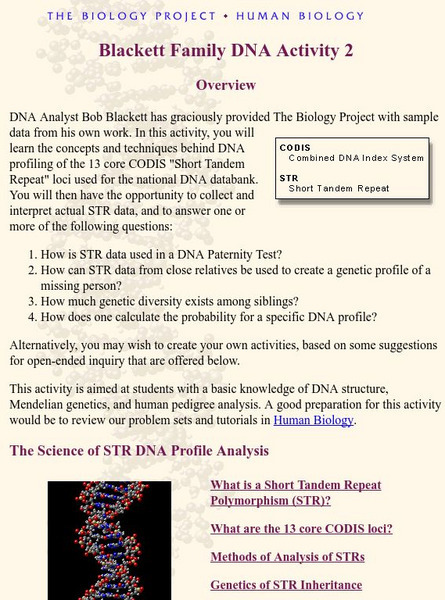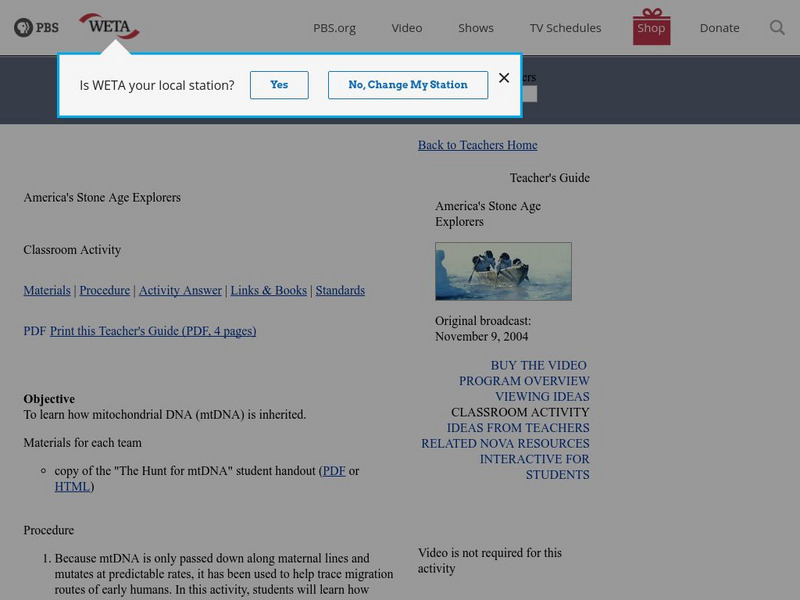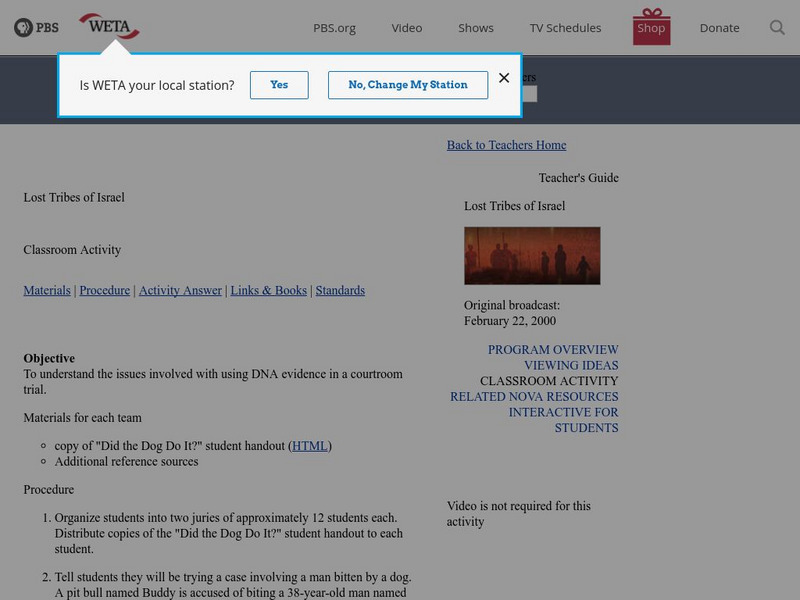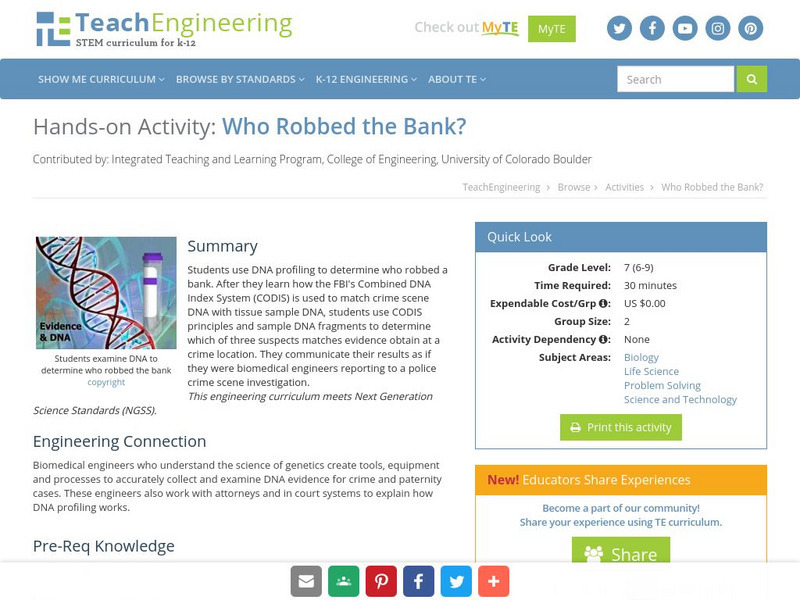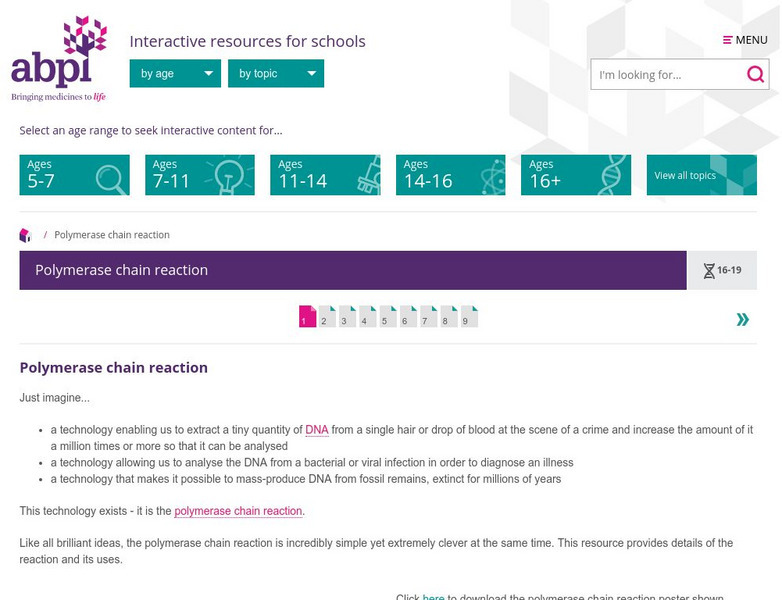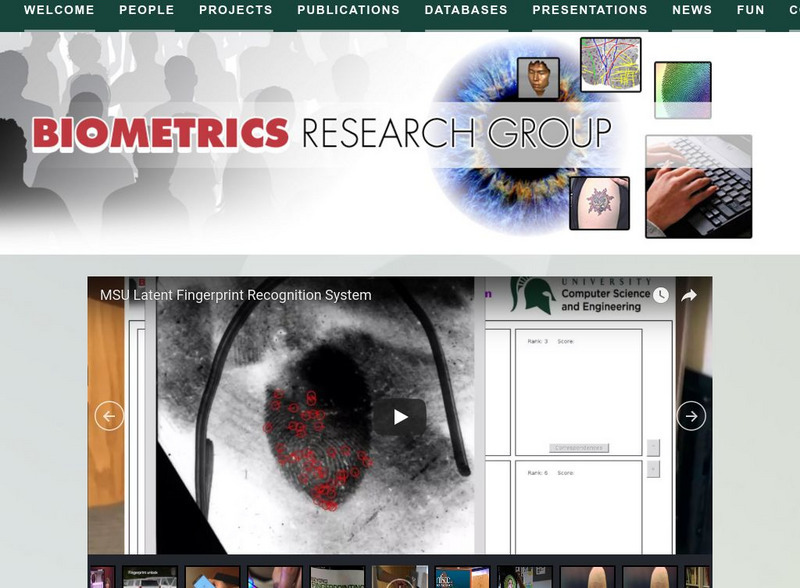University of Arizona
The Biology Project: Human Biology: Blackett Family Dna Activity 2
In this activity, students learn the concepts and techniques behind DNA profiling of the national DNA databank. Students will then have the opportunity to collect and interpret actual STR data, and to answer one or more questions.
University of Arizona
The Biology Project: Human Biology: Blackett Family Dna Activity
Family studies are a good way to learn about DNA profiling and RFLP analysis because students can follow the inheritance of DNA markers from one generation to the next. Students have the opportunity to do this in this activity.
PBS
Pbs Teachers:america's Stone Age Explorers
Discover how mitochondrial DNA (mtDNA) is inherited, and complete a pedigree chart by determining which individuals might share mtDNA with an unknown ancestor.
Georgia Department of Education
Ga Virtual Learning: Ap Biology: Molecular Genetics
This interactive learning module allows AP Biology students to explore DNA and molecular genetics. The study also covers the concepts of biotechnology.
BiologyWise
Biology Wise: Uses of Dna Fingerprinting
Explains what DNA profiling is and describes some of the many ways it is used.
PBS
Pbs Teachers: Lost Tribes of Israel, Dna
Investigate how fingerprinting works, determine what sorts of evidence and questions are important in deciding a court case and understand the issues involved with using DNA evidence in a courtroom trial.
TeachEngineering
Teach Engineering: Who Robbed the Bank?
Students use DNA profiling to determine who robbed a bank. After they learn how the FBI's Combined DNA Index System (CODIS) is used to match crime scene DNA with tissue sample DNA, students use CODIS principles and sample DNA fragments...
Science Buddies
Science Buddies: Testing for Bias in a Photo Lineup
You may have read about criminal cases where innocent people have been wrongly convicted of a crime. Sometimes, modern DNA analysis techniques have provided the evidence to exonerate these innocent people. In many cases, mistaken...
PBS
Pbs: What Jennifer Saw
How can eyewitness identification go wrong? What role can DNA play in protecting the innocent? This interesting site answers these questions and gets the opinions of several DNA experts on this fascinating subject.
The Association of the British Pharmaceutical Industry
Abpi: Polymerase Chain Reaction
An interactive, self-paced lesson on polymerase chain reaction. Students read information and watch descriptive animations to aid in understanding. A self-check quiz follows the activity.
Natural History Museum
Nhm: From Bodies to Bones and Back Again
Can dinosaurs be recreated like in the movie Jurassic Park? This resource describes the reality of re-creating a genetic blueprint of dinosaurs.
Open Curriculum
Open Curriculum: Biotechnology
This illustrated article describes various applications of biotechnology as related to medicine, agriculture, and forensic science.
University of Kansas Medical Center
Univ of Kansas Medical Center: Careers in Human Genetics
This site from the University of Kansas Medical Center provides an excellent list of resources for additional information about careers in genetics.
PBS
Pbs: Interview With Bennett Gershman, Former Prosecutor
Why does the criminal justice system resist reopening cases based on new DNA evidence? This former prosecutor sheds light on the answer in this informative interview.
PBS
Pbs: Interview With Jim Liebman, Constitutional Law Professor at Columbia Univ.
Does innocence matter in our criminal justice system? Don't the DNA cases show that we are not getting the right outcome in more cases than we previously thought?
Michigan Reach Out
Fingerprinting: A Lesson on Classification
Who done it? Basic lesson plan to classify fingerprints. Students can classify their own and classmates fingerprints by taking prints and comparing them to the handout provided.
Michigan State University
Michigan State University: Biometrics Research
This is a site on the use of biometrics in personal identification. Includes a summary of some of the many types of biometric methods under development.
Other
Your Thoughts Is That Really You?
Biometrics has come to refer to the identification of individuals through distinguishing biological features. This article discusses what that might mean to us as individuals.
